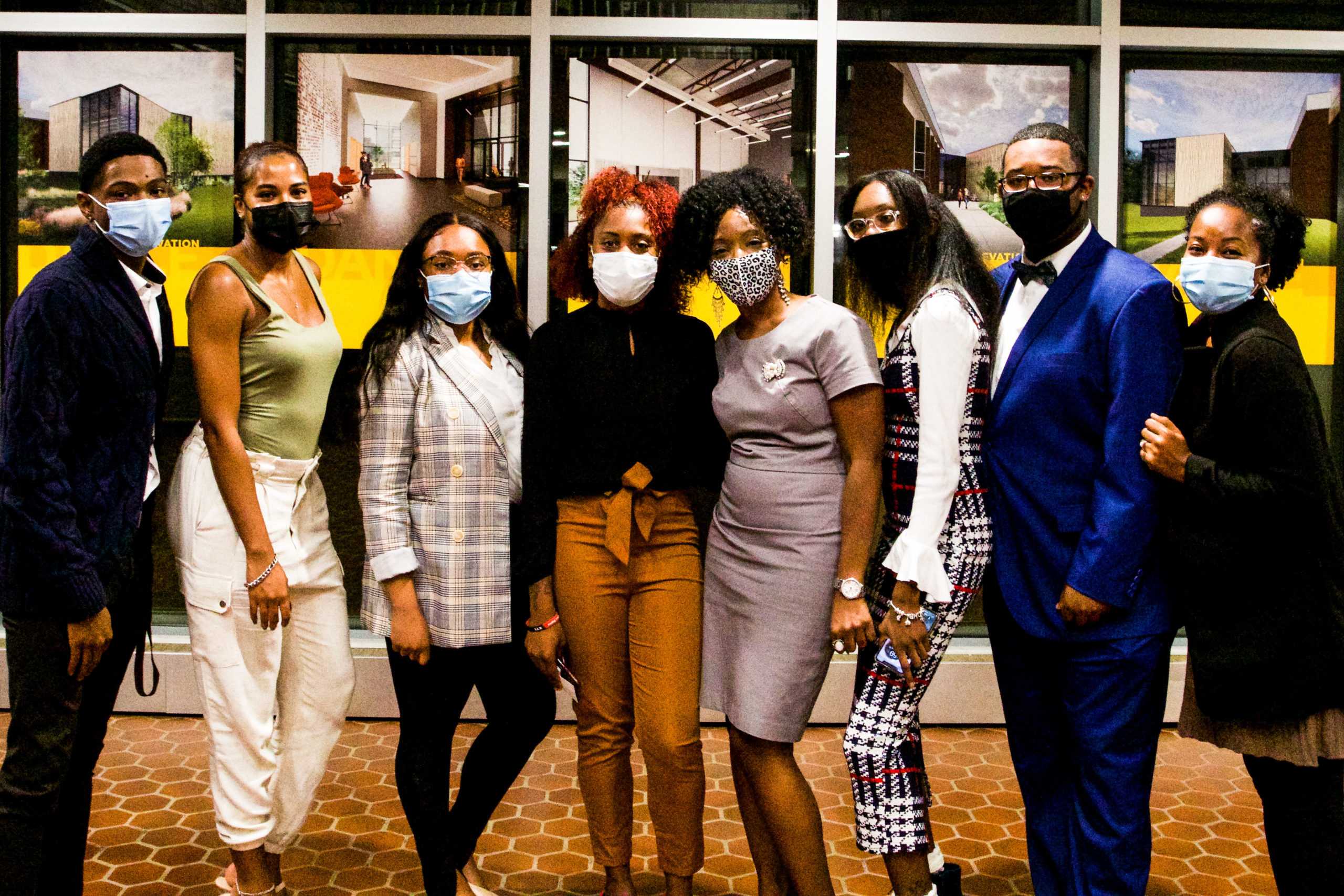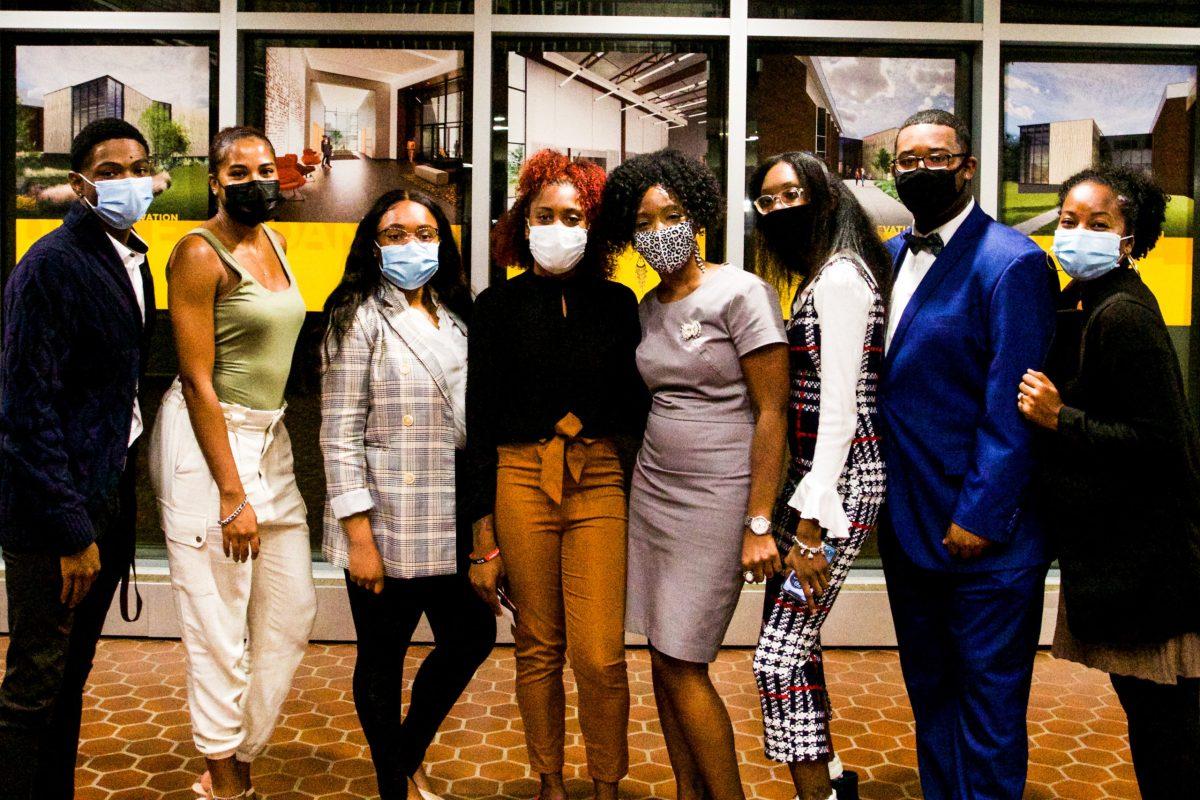The Boyd Recital Hall became the site of an open forum hosted and organized by Rowan’s Black Student Union (BSU) to discuss their hopes for the future of Rowan’s BIPOC community on Wednesday, Oct. 13.
This event was attended by senior university officials including President Houshmand, SGA officers, representatives from local police departments, leaders from the offices of Social Justice, Inclusion and Conflict Resolution (SJICR), Diversity, Equity and Inclusion (DEI), and other student and faculty leaders.
“I believe that we, as students on campus, are going to be the next leaders. We are going to be the best positioned to make a change,” BSU Historian and Rowan NAACP Chapter President Jasmin Jones said upon taking the stand to address the crowd.
Provost and Senior Vice President for Academic Affairs Anthony Lowman echoed the sentiment, as he told all the students gathered in the auditorium that “You are our future.”
During the event, the BSU outlined a series of 10 demands situated at the center of their call to action.
•Demand No. 1: Hold students and faculty accountable for racist remarks and actions.
•Demand No. 2: More racial diversity in faculty, staff and administration.
•Demand No. 3: Racism and Discrimination Training for Staff.
•Demand No. 4: Reallocation of SGA funds to student organizations that promote racial diversity and inclusion.
•Demand No. 5: Support safe spaces for students of color on campus.
•Demand No. 6: Cease the harassment of Black students’ activities.
•Demand No. 7: Demilitarization of the police.
•Demand No. 8: Additional de-escalation training for police.
•Demand No. 9: Set up monthly meetings with police.
•Demand No. 10: Have all students take a course pertaining to the Black diaspora.
Demand No. 1 was an important talking point for Dr. Lowman, who emphasized Rowan’s commitment to serving students and establishing a safe campus for all.
“We must have a campus where we treat everybody with dignity and respect.” Dr. Lowman said. “Everybody deserves that.”
Dr. Lowman also affirmed that any student who has an unresolved issue is always encouraged to come to him directly.
Reporting issues to Rowan’s administration is an important step in the process, Rowan’s administrators said. President Houshmand implored all students to immediately report any serious matters they see, reminding everyone that if nothing is reported, nothing can be done.
Many speakers also strongly emphasized the importance of demand No. 2, calling for greater diversity among staff, faculty and students at Rowan, and few more so than Dr. Chanelle Rose, professor of history and chair of the Africana studies department.
“I think this is so important,” Dr. Rose said. “Not just because of anecdotes students have told me, but because of studies that have been done with regard to student outcomes and performance in classrooms.”
“Students of color often feel isolated in classes at [primarily white institutions],” Dr. Rose added. “Seeing more students who either look like them or can relate to their experiences provides a more inviting cultural space for them to participate and not feel like they’re expected to be the spokesperson for Black issues.”
One study led by researchers from California and Arizona found that diverse faculty is needed to enhance student success, improve grades, and increase retention among students from underrepresented minorities. Faculty diversity, or the lack thereof, is tied to racial disparities in academics.
“In some cases, I will have classes with only two or three students of color,” Dr. Rose said. “And we will have conversations about why students need to see faculty that look like they do.”
DEI Vice President Dr. Penny McPherson-Myers was also in attendance at the event on behalf of the DEI department. As vice president, Dr. McPherson-Myers spearheads many DEI action plans for the university, including anti-racism and discrimination training for staff and faculty.
“We’re seeing a change from faculty and students,” Dr. McPherson-Myers said. “They are personally and professionally interested in learning more and participating in DEI’s training programs.”
“We are continually proud that this program continues to fill up every time we promote it,” Dr. McPherson-Myers said of the department’s anti-bias training initiatives.
Speakers from the BSU board also announced their hopes to make progress on demands No. 4 and No. 5, the reallocation of SGA funds towards clubs that promote racial diversity and inclusion, and the support of safe spaces for students of color on campus, respectively.
“We are more than happy to work with the Black Student Union to address their concerns and I personally am honored and excited to help this group of students. I am already in contact with their executive board and we are scheduling a meeting in the upcoming weeks to discuss these demands with them,” SGA President Matthew Beck said.
Speakers at the event also affirmed the need for more progress on demand No. 6, “cease the harassment of Black student’s activities.”
Although there are many policies, which were discussed, in place to safeguard Rowan’s students of color, BSU President Leilanie Hinton expressed concern that “although these regulations are in place, they are not always followed.”
During his speech, President Houshmand made it a personal point to reassure everyone in attendance.
“We want you to know there’s no need to be fearful of anybody,” he said, “whether they are students, faculty or police officers.”
As demands No. 7, 8 and 9 were announced, guest speaker and Rowan Police Lieutenant Rachel Baum took the stand to address their plans to accommodate said demands.
Baum also announced that the Rowan Police Department is committed to meeting in person with the BSU to discuss these demands further.
BSU Vice President Jamar Green hopes that this meeting will resolve these issues and strengthen the connection between Rowan’s Police and Public Safety and Rowan’s students of color.
“By working with Rowan Police/Public Safety, together we can ensure that all Black and Brown students feel safer and not that they are being heavily policed on campus,” Green said.
While many of the demands are ones that have carried over from previous years, the BSU saved one brand-new demand for the end. That demand, demand No. 10, is about adding a requirement for all students to take a course on the Black diaspora.
Many of the faculty that appeared at the event emphasized the importance of such courses.
In addition to being Assistant Director of Strategic Initiatives in the Office of Career Advancement, Dr. Alicia Monroe is also the creator of Rowan’s first course on the Black Lives Matter movement.
“Courses around race, culture, ethnicity – those areas that you don’t necessarily want to grapple with, is what Gen Z needs us to do,” Dr. Monroe said. “It’s not about creating a movement… it’s about bringing an understanding of diverse worldviews.”
“Diverse course offerings that reflect the “asks and desires” of students and identities of the Rowan mosaic is the “new normal” that will frame a fair and just learning community that truly represents all.” Dr. Monroe said. “The time is now to have this become Rowan’s reality and truth.”
Upon attending the event, it became clear that it carried a profound meaning for all the organizers, keynote speakers and attendees.
For BSU Vice President Jamar Green, watching the event come together felt exhilarating.
“Organizing this event meant a lot to me,” Green said. “It meant that I would be a part of change that will soon come to Rowan’s campus because we all know change doesn’t just happen overnight. Although I may not be at Rowan when the change happens, I do know change will come and I will know that I was a part of the change that made Rowan a better place.”
“Unbeknownst to me,” Dr. Monroe said, “several of the student leaders that were facilitating the event either took my BLM course or were Rowan ASPIRE alumnx… it was truly rewarding to see the course content and skills development take form through the action of the students.”
Dr. Rose notes how great it was to see Black students on campus making a list of demands that reflect their important concerns while making a concerted effort to hold Rowan University accountable.
“Since I teach civil rights/Black Power Movements,” Dr. Rose remarks, “it was encouraging to see Black students at Rowan carry on the legacy of activism that is rooted in the Black Studies Movement, but also frustrating to see that some of their demands echoed the sentiments of those fighting for change fifty years ago.”
For comments/questions about this story tweet @TheWhitOnline or email [email protected]


























































































































































!["Working with [Dr. Lynch] is always a learning experience for me. She is a treasure,” said Thomas. - Staff Writer / Kacie Scibilia](https://thewhitonline.com/wp-content/uploads/2025/04/choir-1-1200x694.jpg)









































